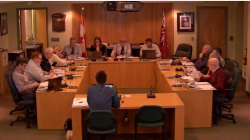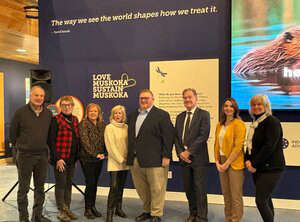
The Friends of Muskoka Watershed say 70% of local lakes have too much chloride
Bracebridge was advised about a ‘Citizen Scientist’ program being launched in Muskoka to combat the impacts of road salt on the environment, in the May 6, 2025, General Committee meeting.
Neil Hutchinson, of Friends of Muskoka Watershed (FMW) warned, “The chloride ion in road salt is toxic,” yet testing showed elevated levels in 70% of lakes in Muskoka, with harmful results in 12%.
According to the FMW, Chloride gets into drains and the water from salting roads and highways, parking lots, driveways, sidewalks, and leaking from corroded storage facilities, and doesn’t break down.
Hutchinson indicated that ironically there are increasing amounts of salt being used to the point where he said he’s slipping over it, rather than the ice it’s being used for.
He added that it’s destroying the aquatic life and freshwater plankton that keeps the lakes clean by lower algae levels. “We’re worried that 25% of our lakes could be in trouble,” he said.
Other impacts of salt include rot to steel buildings, and damaging drinking water, soil, trees vehicles, clothes, pets, and public and personal assets.
30,000 tonnes of road salt enters Lake Muskoka each year, causing economic and environmental impact of $680-$3,900 per tonne or $41 million-$234 million per year, reported Hutchinson.
As one of many measures to help combat the problem the FMW has launched a program called Citizen Scientists, where the public can get involved with measuring trace sources of Chloride at various locations. Hutchinson said this way they can “can cover larger areas than one association [could].”
Hutchinson added that this is valuable because the government also listens to citizens.
According to the FMW, the program works by having citizens using special pens to measure conductivity at different sites. So far “Citizen Scientists found an enormous range in conductivity at 26 sites in Muskoka,” said Hutchinson.
The FMW is also trying to raise $70,000 over 2 years, including $5,000 from each municipality, in addition to funds from private donors and contributions to help with their ongoing efforts.
Community measures recommended by the FMW include individuals, the municipality, stores, and contractors reducing the amount of road salt used, using winter tires, wearing proper footwear, reduce driving speed, shovelling more, sweeping up and reusing the excess salt, replacing salt with sand, “spread the word, not the salt,” and adopt the Smart About Salt



 Town of Huntsville Council considering $2.1 million cost to repair Brunel Lift Locks
Town of Huntsville Council considering $2.1 million cost to repair Brunel Lift Locks
 Police looking for snowmobile taken from Bella Lake area
Police looking for snowmobile taken from Bella Lake area
 Early Spring forecasted by Wiarton Willie
Early Spring forecasted by Wiarton Willie
 Province invests $1.3 in Gravenhurst tourism
Province invests $1.3 in Gravenhurst tourism
 TLDSB announces new Outdoor Education Centre
TLDSB announces new Outdoor Education Centre












Comments
Add a comment